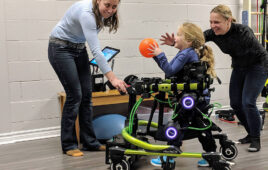|
Listen to this article
|

Kevin Piette carries the Olympic torch in Paris wearing a device in the final stages of R&D. | Source: Wandercraft
A paraplegic person carried the Olympic torch as part of the traditional relay using an exoskeleton developed by Wandercraft SAS.
Kevin Piette, 35, has been paraplegic since a motorcycle accident 11 years ago, according to Le Parisien. He is a trained “test pilot” for Wandercraft. The Paris-based company said it has built its Personal Exoskeleton to help people with disabilities walk.
Wandercraft already offers the U.S. Food and Drug Administration-cleared Atalante X exoskeleton for individuals with spinal cord injuries (SCIs). Atalante X, a self-balancing robotic exoskeleton, enables people with limited mobility to stand up and walk again.
The Personal Exoskeleton device used by Piette is a prototype in the final stages of research and development, said Wandercraft. According to a spokesperson, the company plans to enter into usability and clinical trials soon.
Piette wears exosuit to carry Olympic torch
Piette, who typically uses a wheelchair, became the first user of a self-balancing exoskeleton to walk in torch relay before the Olympics, the company claimed.
He can be seen walking with the torch in Paris on this video, shared by Le Média Positif on X (formerly Twitter).
🇫🇷 Kevin Piette, paraplégique depuis un accident, est entré dans l’histoire aujourd’hui en portant la flamme olympique avec son exosquelette ! 👏
🎥 wandercraftofficialpic.twitter.com/HTy5MrYE6Z
— Le Média Positif 🍀 (@LMPositif) July 23, 2024
Wandercraft marks 2024 milestones
Earlier this year, Wandercraft brought in over €25 million ($27 million) in financing from the European Investment Bank (EIB). The company said it plans to use the funding to develop its Personal Exoskeleton and to accelerate patient access to Atlante X.
“At Wandercraft, our focus is on improving patient outcomes and creating a world where everyone can stand up and walk,” stated Matthieu Masselin, CEO of Wandercraft. “From restoring a parent’s ability to walk their child’ down the aisle to the simple act of standing and shaking hands after a meeting, we are eager to provide patients with the full range of experiences that life has to offer.”
“This commitment from the EIB allows us to further accelerate our already rapid advancement in achieving this mission and furthers our ability to impact more people faster than ever,” he added.
In February, the FDA cleared Atalante X for rehabilitation in individuals with SCI at Levels T5 to L5. Wandercraft said its team believes that everyone should have the opportunity to stand up and walk in their everyday lives.
The company added that it looks forward to continued testing, clinical trials, and working with regulators to bring the benefits of robotics to the rehabilitation and personal use market. Wandercraft said it expects usability and clinical trials soon. The Personal Exoskeleton is not yet available for commercial use.
Editor’s note: This article was syndicated from The Robot Report sibling site MassDevice.




Tell Us What You Think!